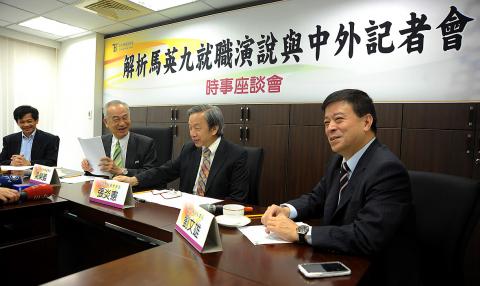President Ma Ying-jeou’s (馬英九) inaugural speech on Sunday was vague, conflicting and cliched, addressing neither what should be done to solve domestic economic woes nor uphold Taiwan’s sovereignty, political analysts told a forum yesterday.
The president did not address what he would do to rejuvenate Taiwan’s economy, nor did he apologize for a series of ill-advised policies, such as fuel and electricity price increases and the controversy over imports of meat containing the feed-additive ractopamine, said Wu Rong-i (吳榮義), president of the Taiwan Brain Trust think tank, which organized the forum.
Wu desribed the speech as having “one no and four withouts” — meaning Ma showed no -understanding of public opinion, while he failed to apologize for poor policies, showed no self-introspection, insisted on using the “one China” framework and put forward no new ideas.

Photo: Liu Hsin-de, Taipei Times
Ma misinterpreted the Republic of China (ROC) Constitution in his speech because the “outdated” Constitution should not be used to explain Taiwan’s sovereignty and the “status quo,” Taiwan Association of University Professors -president Chang Yen-hsien (張炎憲) said.
Moreover, Chang said, as the president of Taiwan, Ma’s highlighting “Zhonghua Culture (中華文化)” and “Zhonghua Minzu (中華民族)” was “completely impractical” and neglected Taiwan’s traditional culture and values.
“The emphasis on Zhonghua Minzu was just what Beijing wanted to hear because it reaffirmed the connection between Taiwan and China. It also implies that Ma favors eventual unification,” he said.
Ma’s reiteration of the “one country, two areas (一國兩區)” formula suggested “de facto unification,” mislead the international community and legitimized Beijing’s anti-secession law, which was ratified in 2005, said David Huang (黃偉峰), a researcher at Academia Sinica.
The “one country, two areas” proposal raised eyebrows earlier this year when former Chinese Nationalist Party (KMT) chairman Wu Poh-hsiung (吳伯雄) delivered it to Chinese President Hu Jintao (胡錦濤) during a visit to Beijing.
“It’s clear that the international community recognizes the China in ‘one China’ as the People’s -Republic of China, not the ROC,” Huang said.
People First Party Deputy Secretary-General Liu Wen-hsiung (劉文雄) said Ma had turned his back on the people with his inconsistent policies, arrogance and authoritarianism.
Some of Ma’s policies seemed to be conflicting, Liu said, such as his plan to establish a free-trade area in Greater Kaohsiung to attract Chinese investment and his pledge to join the Trans-Pacific Partnership, an economic integration that aims to contain China, in eight years.

DEFENSE: The National Security Bureau promised to expand communication and intelligence cooperation with global partners and enhance its strategic analytical skills China has not only increased military exercises and “gray zone” tactics against Taiwan this year, but also continues to recruit military personnel for espionage, the National Security Bureau (NSB) said yesterday in a report to the Legislative Yuan. The bureau submitted the report ahead of NSB Director-General Tsai Ming-yen’s (蔡明彥) appearance before the Foreign and National Defense Committee today. Last year, the Chinese People’s Liberation Army (PLA) conducted “Joint Sword-2024A and B” military exercises targeting Taiwan and carried out 40 combat readiness patrols, the bureau said. In addition, Chinese military aircraft entered Taiwan’s airspace 3,070 times last year, up about

A magnitude 4.3 earthquake struck eastern Taiwan's Hualien County at 8:31am today, according to the Central Weather Administration (CWA). The epicenter of the temblor was located in Hualien County, about 70.3 kilometers south southwest of Hualien County Hall, at a depth of 23.2km, according to the administration. There were no immediate reports of damage resulting from the quake. The earthquake's intensity, which gauges the actual effect of a temblor, was highest in Taitung County, where it measured 3 on Taiwan's 7-tier intensity scale. The quake also measured an intensity of 2 in Hualien and Nantou counties, the CWA said.

The Overseas Community Affairs Council (OCAC) yesterday announced a fundraising campaign to support survivors of the magnitude 7.7 earthquake that struck Myanmar on March 28, with two prayer events scheduled in Taipei and Taichung later this week. “While initial rescue operations have concluded [in Myanmar], many survivors are now facing increasingly difficult living conditions,” OCAC Minister Hsu Chia-ching (徐佳青) told a news conference in Taipei. The fundraising campaign, which runs through May 31, is focused on supporting the reconstruction of damaged overseas compatriot schools, assisting students from Myanmar in Taiwan, and providing essential items, such as drinking water, food and medical supplies,

New Party Deputy Secretary-General You Chih-pin (游智彬) this morning went to the National Immigration Agency (NIA) to “turn himself in” after being notified that he had failed to provide proof of having renounced his Chinese household registration. He was one of more than 10,000 naturalized Taiwanese citizens from China who were informed by the NIA that their Taiwanese citizenship might be revoked if they fail to provide the proof in three months, people familiar with the matter said. You said he has proof that he had renounced his Chinese household registration and demanded the NIA provide proof that he still had Chinese